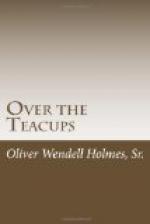“‘I think it does,’ I answered. ’It does n’t seem to me that you gained a great deal by leaving your customary adviser for the specialist.’
“‘Well,’ my friend continued, ’following my wife’s urgent counsel, I kept on, as I told you, for a whole year with my specialists, going from head to foot, and tapering off with a chiropodist. I got a deal of amusement out of their contrivances and experiments. Some of them lighted up my internal surfaces with electrical or other illuminating apparatus. Thermometers, dynamometers, exploring-tubes, little mirrors that went half-way down to my stomach, tuning-forks, ophthalmoscopes, percussion-hammers, single and double stethoscopes, speculums, sphygmometers,—such a battery of detective instruments I had never imagined. All useful, I don’t doubt; but at the end of the year I began to question whether I should n’t have done about as well to stick to my long tried practitioner. When the bills for “professional services” came in, and the new carpet had to be given up, and the old bonnet trimmed over again, and the sealskin sack remained a vision, we both agreed, my wife and I, that we would try to get along without consulting specialists, except in such cases as our family physician considered to be beyond his skill.’”
The Counsellor’s story of his friend’s experiences seemed to please the young Doctor very much. It “stirred him up,” but in an agreeable way; for, as he said, he meant to devote himself to family practice, and not to adopt any limited class of cases as a specialty. I liked his views so well that I should have been ready to adopt them as my own, if they had been challenged.
The young Doctor discourses.
“I am very glad,” he said, “that we have a number of practitioners among us who confine themselves to the care of single organs and their functions. I want to be able to consult an oculist who has done nothing but attend to eyes long enough to know all that is known about their diseases and their treatment,—skilful enough to be trusted with the manipulation of that delicate and most precious organ. I want an aurist who knows all about the ear and what can be done for its disorders. The maladies of the larynx are very ticklish things to handle, and nobody should be trusted to go behind the epiglottis who has not the tactus eruditus. And so of certain other particular classes of complaints. A great city must have a limited number of experts, each a final authority, to be appealed to in cases where the family physician finds himself in doubt. There are operations which no surgeon should be willing to undertake unless he has paid a particular, if not an exclusive, attention to the cases demanding such operations. All this I willingly grant.
“But it must not be supposed that we can return to the methods of the old Egyptians—who, if my memory serves me correctly, had a special physician for every part of the body—without falling into certain errors and incurring certain liabilities.




